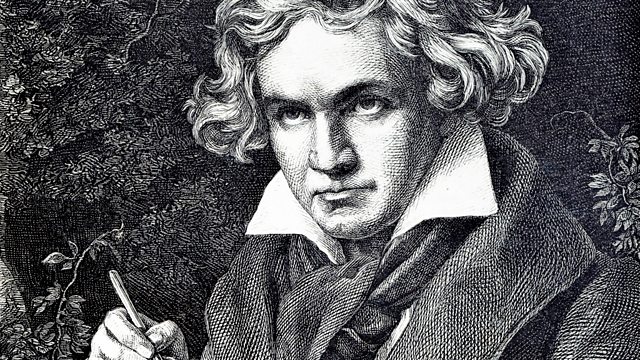
Wagner and Beethoven
Donald Macleod focuses on possibly the greatest single influence on Wagner's music and philosophy, the work of Beethoven.
As ����ý Radio 3 celebrates the 200th anniversary of Wagner's birth, Composer Of The Week explores the connections and relationships that helped establish him as the most revolutionary musical thinker of the 19th century. Donald Macleod investigates the composers who exerted the most profound influence on Wagner, including Beethoven, Meyerbeer, Palestrina and Liszt, and those he left an indelible mark upon, including Strauss, Bruckner and Wolf.
Works by these figures, who shaped Wagner's musical world, are threaded through a week of Wagner's own music, spanning his entire career - and if you were expecting to hear solely opera, think again! Alongside highlights from his famous masterpieces for the stage, including Das Rheingold, Die Walküre, Götterdämmerung, Die Meistersinger, Lohengrin and Parsifal, there's a rare opportunity to discover three of the composer's very few compositions for piano, occasional works for wind band and male voice choir, and even Wagner's own youthful arrangement of Beethoven's Ninth Symphony.
We will also be shining a light on Wagner's lesser known, early operas, created under the spell of such diverse influences as the German Romantic operatic tradition of Weber, the "bel canto" style of singing of Bellini, and French Grand Opera of the 1830s. Donald Macleod presents excerpts from Wagner's earliest opera Die Feen, his sunny, Italian-esque Das Liebesverbot, and the 'black sheep' of Wagner's output: his vast operatic spectacular Rienzi - which he later virtually disowned.
Selected recordings showcase some of the finest Wagner performances put to disc - with historic interpretations by great Wagnerians such as Wolfgang Sawallisch, Georg Solti, Rudolf Kempe, James Levine and Daniel Barenboim.
--
Donald Macleod begins the week by exploring possibly the greatest single influence on Wagner's work, the music of Ludwig van Beethoven. Beethoven's presence loomed large in Wagner's mind from his very earliest works, including a highly Beethovenian piano sonata, to the apotheosis of his Ring Cycle: Brünnhilde's immolation at the climax of Götterdammerung.
Listeners have a very rare opportunity to hear an excerpt from Wagner's own youthful arrangement of Beethoven's Choral Symphony, and Donald Macleod explains the colossal influence Beethoven's synthesis of music and poetry would have on Wagner's own theories of music-drama. We'll also hear Wagner's only substantial mature piano work, a one-movement piano sonata dedicated to his mistress Mathilde Wesendonck.
Last on
More episodes
Previous
You are at the first episode
![]()
Explore photos, writing and comments around a week of programmes celebrating Wagner.
Music Played
-
![]()
Richard Wagner
Piano Sonata in A major, Op 4 (Grosse Sonate)- 1. Allegro con moto
- Brilliant 94450.
- 2.
-
![]()
Richard Wagner
Das Rheingold - Descent into the Nibelheim (end of Scene 2, opening Scene 3)
- Teldec 4509 911852.
- 17.
-
![]()
Ludwig van Beethoven
Symphony No. 9 (choral) - IV. finale
- BIS CD950.
- 4.
-
![]()
Richard Wagner
Gotterdammerung - Brunnhilde Immolation Scene (Act III)
- Decca 455 569 2.
- 18.
-
![]()
Richard Wagner
Piano Sonata in A flat (fur das Album von Frau Mathilde Wesendonck)
- Deutsche Grammophon 477 943 9.
- 2.
Broadcasts
- Mon 20 May 2013 12:00����ý Radio 3
- Mon 20 May 2013 18:30����ý Radio 3
- Mon 2 May 2016 12:00����ý Radio 3
- Mon 2 May 2016 18:30����ý Radio 3
Beethoven Unleashed – the box set
What was really wrong with Beethoven?
Composers A to Z
Who knew? Five eye-opening stories from Composer of the Week
Five reasons why we love Parry's Jerusalem
What is the strange power of Jerusalem which makes strong men weep?
A man out of time – why Parry's music and ideas were at odds with his image...
The composer of Jerusalem was very far from the conservative figure his image suggests.
Composer Help Page
Find resources and contacts for composers from within the classical music industry.






